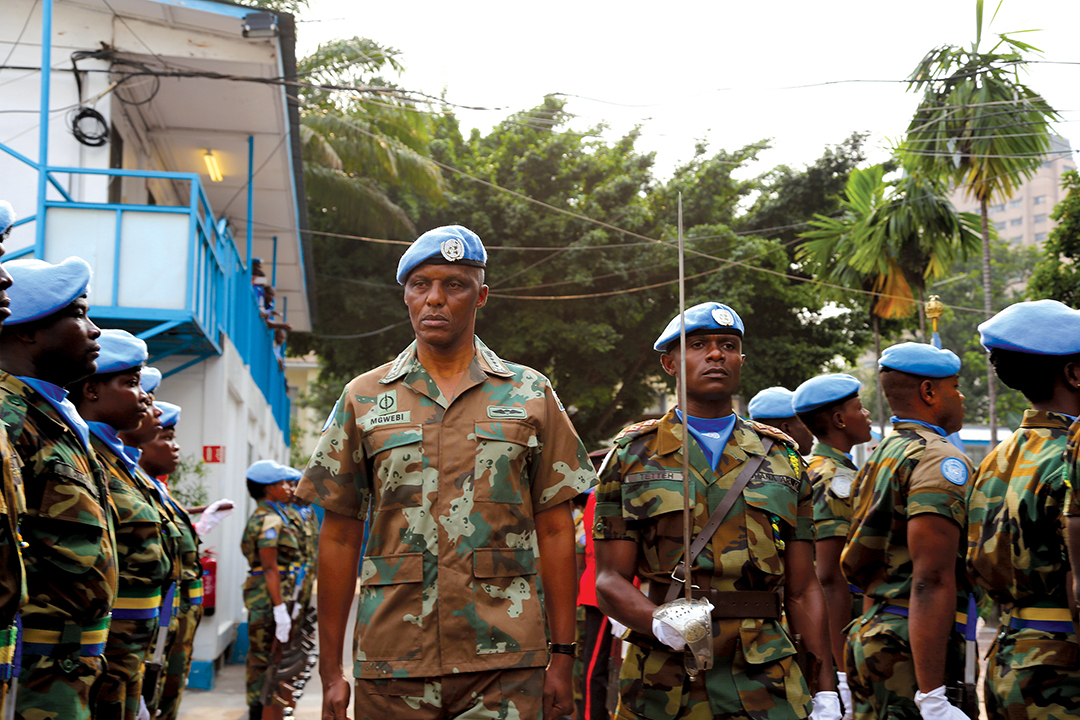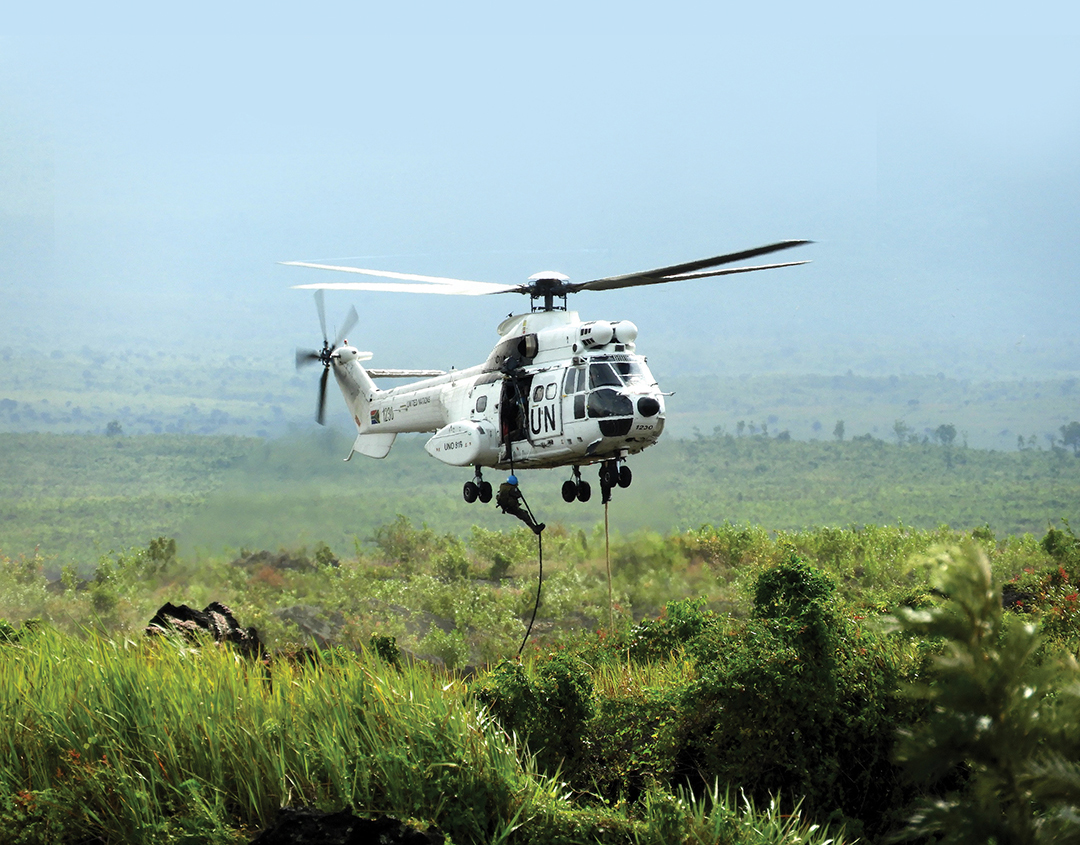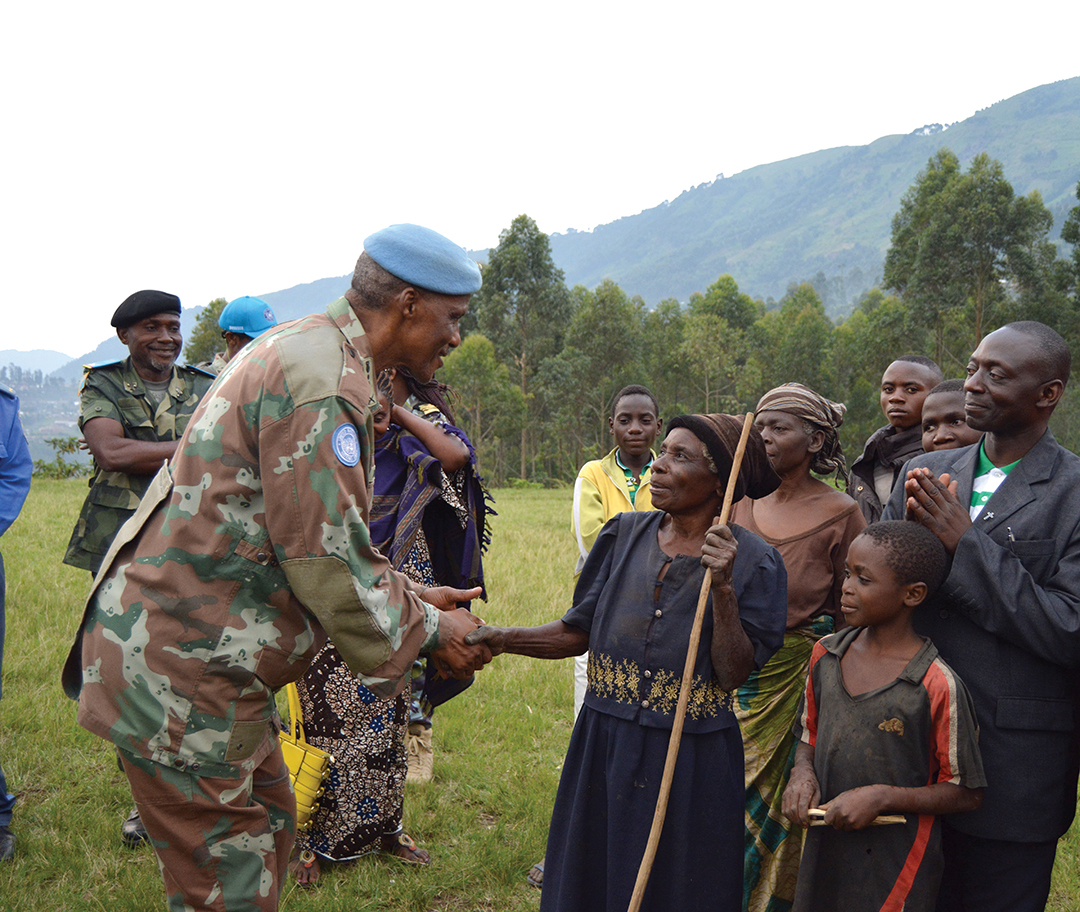Projecting Force to Protect a Country
MONUSCO’s Force Commander Says Technology Helps Peacekeepers Overcome Challenges in the DRC, but Improvements Are Needed
PHOTOS BY MONUSCO
Since 2016, Lt. Gen. Derrick Mbuyiselo Mgwebi of South Africa has served as force commander of the United Nations Organization Stabilization Mission in the Democratic Republic of the Congo (MONUSCO), the largest U.N. peacekeeping mission in the world. Mgwebi has more than 35 years of military experience and has held multiple senior posts for the South African National Defence Force (SANDF), including his current position as chief of joint operations. Previously, he served as the SANDF director of special forces, director of training and operations, military secretary at the Ministry of Defence, and director of the South African Army Infantry Formation. From 2004 to 2006, he served as force commander for the U.N. Operation in Burundi. He spoke to ADF from MONUSCO headquarters in Kinshasa. This interview has been edited to fit this format.
ADF: The Democratic Republic of the Congo (DRC) poses unique challenges due to its size, difficult geography and the fact that it has only 2,250 kilometers of paved roads. How have you worked to overcome these daunting challenges?
LT. GEN. MGWEBI: For the past 15 years or so we have, as a MONUSCO force, been more static in the sense that we’ve been occupying certain hot spots where we put up company operating bases, and we operate from those bases. But with the reduction of the force, we are required to work a little bit smarter. We’ve been directed by the Security Council through the secretary-general that we need to be flexible, we need to be versatile. Now, that flexibility demands that the forces must be able to have information through the use of technology and in terms of situational awareness, not only using the UAVs (unmanned aerial vehicles), but we’re going to have to collect intelligence and be able to monitor the geolocation of those who are communicating with bad intention and be able to have an idea of where they’re operating. Then, to be more flexible and agile, you need air assets. You must be informed by the intelligence, get it in time, and conduct intelligence-driven operations using helicopters. That means your forces must be trained in conducting heliborne operations: rappelling, fast-roping and be able to sustain themselves for 14 or 15 days without being resupplied. You need to be able to be there and do what needs to be done with less effort in terms of traveling by road. So we are looking at air assets, we’re looking at technology, we’re looking at a different type of force. Of course, it speaks to training and it speaks to attitude. The protection of civilians is going to be done through the projection of force.
ADF: In 2013, MONUSCO became the first peacekeeping mission in the world to use UAVs when it took delivery of five Italian-made Selex ES Falco aircraft. Has this tool helped you fulfill your mandate to protect civilians?
LT. GEN. MGWEBI: It has. First of all, you’ve got different armed groups in the Congo operating in remote areas. The UAV saves you the time and effort and resources to go everywhere. The UAV can scan the environment, it can take pictures, regardless of if it’s during the day or during the night. Then you can be able to examine the object you are seeing. Is it a base of an enemy armed group or is it a base of the government armed forces? You can confirm that. Once you can determine whether they are armed people or if they’re women and children, your targeting is assisted and simplified by the UAV. Then when you go out there, you know what kind of force you need to apply depending on your analysis of the target.
ADF: MONUSCO became a different type of U.N. mission in 2013 with the creation of the Force Intervention Brigade (FIB), a 3,000-troop unit that is authorized to use force to neutralize enemy armed groups. How has the FIB been used, and how has it helped your ability to take the fight to militia groups? Has it worked as intended?
LT. GEN. MGWEBI: Has it had its intended effect? The answer is yes and no. The yes part of it is when it was formed it was quite clear that there was the M23 rebel group sitting out there overseeing Goma. It was wearing quite clear defense uniforms. No women, no children. It was a classical enemy that everyone could see. Therefore, coming up with the FIB, that was a good idea and that was a good tool to deal with the M23. They did very well. Since then, they came to realize that the remaining armed groups, especially the foreign ones, like the [Allied Democratic Forces], the FDLR, the LRA, they’re a different kettle of fish. They are wearing FARDC (Armed Forces of the DRC) uniforms, they have children in the army, they have women in the army. They tend to mix with the various communities. When you are ready to attack them, sometimes they change uniforms and present themselves as ordinary farmers. So it becomes more of an asymmetric kind of war, which then changes totally the attitude and the culture and the equipment and the training of the original FIB. So, in 2016, when I came on board as the force commander, I realized this. We have gone back to the member states, those who contribute to the FIB, and said let’s look at the culture of the FIB, let’s look at the training, the equipment, and begin to say: “Are they really ready to engage in this asymmetric war?” We all agreed that something needs to be done. Hence, we have begun to look at a different culture and different equipment to deal with what’s facing us. That’s why I said, ‘Yes, they’ve been successful,’ but now they’ve come up against an asymmetric situation, which we need to analyze to make sure it can be used effectively.
ADF: During the last reporting period, the secretary-general said 85 percent of “protection of civilian” alerts were responded to either by MONUSCO or the FARDC. What does this mean, and is it good enough?
LT. GEN. MGWEBI: There’s a challenge that speaks to the chain of defense in the troop-contributing countries. If this is what you’d call a war, peacekeeping more belongs to platoon commanders and company commanders. The people must respond in time at that level. There is a challenge in terms of some not responding as soon as possible. We have also designed a tool to measure their effectiveness and their performance. It just gives us an example to say to the battalion commanders: “You are lagging there.” Because of the issue of possible reduction of forces, we are saying that if you are found wanting, we will be recommending that any battalion commander and his forces should be sent home because they are not effective, they are not performing, they are not responding. We are trying to encourage them, we are trying to assist them, but also we are trying to tell them that at the end of the day there must be consequences for not responding. So, 70 to 80 percent, these are not the results we are happy with. We should be able to respond, if possible, 100 percent of the time. We are not perfect, but we are striving for perfection.
 ADF: Should the FIB model be replicated in other peacekeeping missions?
ADF: Should the FIB model be replicated in other peacekeeping missions?
LT. GEN. MGWEBI: If you look at South Sudan, they’ve also come up with a regional protection force of 4,000 troops, so the U.N. is following that route. It’s good but there are things we need to fine-tune. One of those is the issue of command and control and the issue of unity in terms of the bigger force of the U.N. and the cohesion, which must be there. It’s a big challenge because you have a sense that some of the forces tend to look at the structure of a force like the FIB in a different manner, and the FIB themselves tend to look at the others as if they’re not here for real commitment and readiness to do what needs to be done. So the command and control structures, the working relationship, it needs strong leadership and, of course, it needs planning in terms of how you write your mandate and the rules of engagement. You need to develop a working relationship with all those serving. Because you’ll find the FIB working in an area of another brigade and they need to be supported by that brigade, but if the working relationship is not good, if command and control lines of communication are not clarified, then there’s going to be a challenge in terms of support and it can lead to dysfunction. It’s a very sensitive and very complex arrangement we have.
ADF: You restarted the cooperation agreement with the FARDC. How would you describe the cooperation between MONUSCO forces and the FARDC? Have there been successes? Are there areas that need improvement?
LT. GEN. MGWEBI: The process is advanced. We’re probably on the third year. Initially it was reviewed on a six-month basis, but we felt that six months is too short a time, so we moved to an annual basis. We are now looking at what has worked and what is not working. I think, in the main, it’s working very well when we talk about joint planning, joint operations, coordinated operations. Of course, you have a challenge with the human rights due diligence policy that once you start working with the non-U.N. forces we need to make sure that the forces we’re working with are not involved and have never been involved in human rights abuses. Some of the commanders of the FARDC on the ground are a little bit sensitive to this. But we try to indicate to them that this is not only applicable to them, it is applicable to all of us and therefore it is also part of informing and educating them about the human rights due diligence policy. It facilitates our working, it also reduces some of the human rights violations by some of their junior commanders and their folks on the ground. As I’m speaking to you we are also conducting joint planning. That will cover us all the way from the northern border of DRC, which is bordering the Central African Republic, South Sudan and Uganda, and it goes all the way south into Uvira, which is bordering Burundi and Tanzania. So if you look at that Eastern front, we are conducting joint planning, which is going to lead to us conducting operations in a coordinated, joint way for the next three months; therefore there is improvement.
 ADF: In April 2017 you were asked to stay on for a second term as force commander. Looking forward at the rest of your tenure, what do you think is going to be the most important thing you and MONUSCO can do to lay the groundwork for a lasting peace in the DRC?
ADF: In April 2017 you were asked to stay on for a second term as force commander. Looking forward at the rest of your tenure, what do you think is going to be the most important thing you and MONUSCO can do to lay the groundwork for a lasting peace in the DRC?
LT. GEN. MGWEBI: I think the most important thing for the DRC is that the politics must align, and there must be good governance. All that we are doing is trying to create a conducive environment for those things to happen. We are not going to succeed unless and until the leadership, the general populace and the civil society agree that there needs to be good governance, and they need to respect the people. For me, I would love to see that the security sector reform is taken seriously. You’re giving people skills to do the right things, but if the direction they are getting at a political, strategic level is not a good direction or a good policy, then you are going to be challenged for the rest of your life. So, for me, the thing I am going to be working very hard for is that the MONUSCO security sector reform is strengthened and also work very closely with the Congolese in uniform so they begin to understand that they can get out of this challenge only if they look at how they do their administration, how they govern and manage their forces. This includes payment, taking care of the sick, and making sure that those who are deviating from the good policy direction, they take them to task, and if it comes to it, punish them for their deeds as a lesson to the others. That is what I will try to do while I am around here. At the end of the day, we want the security forces of the DRC to do it on their own, without us.


Am proud to have been groomed and worked under his command. A truly down to earth soldier albeit of royal household. A Xhosa prince and Crown adviser.